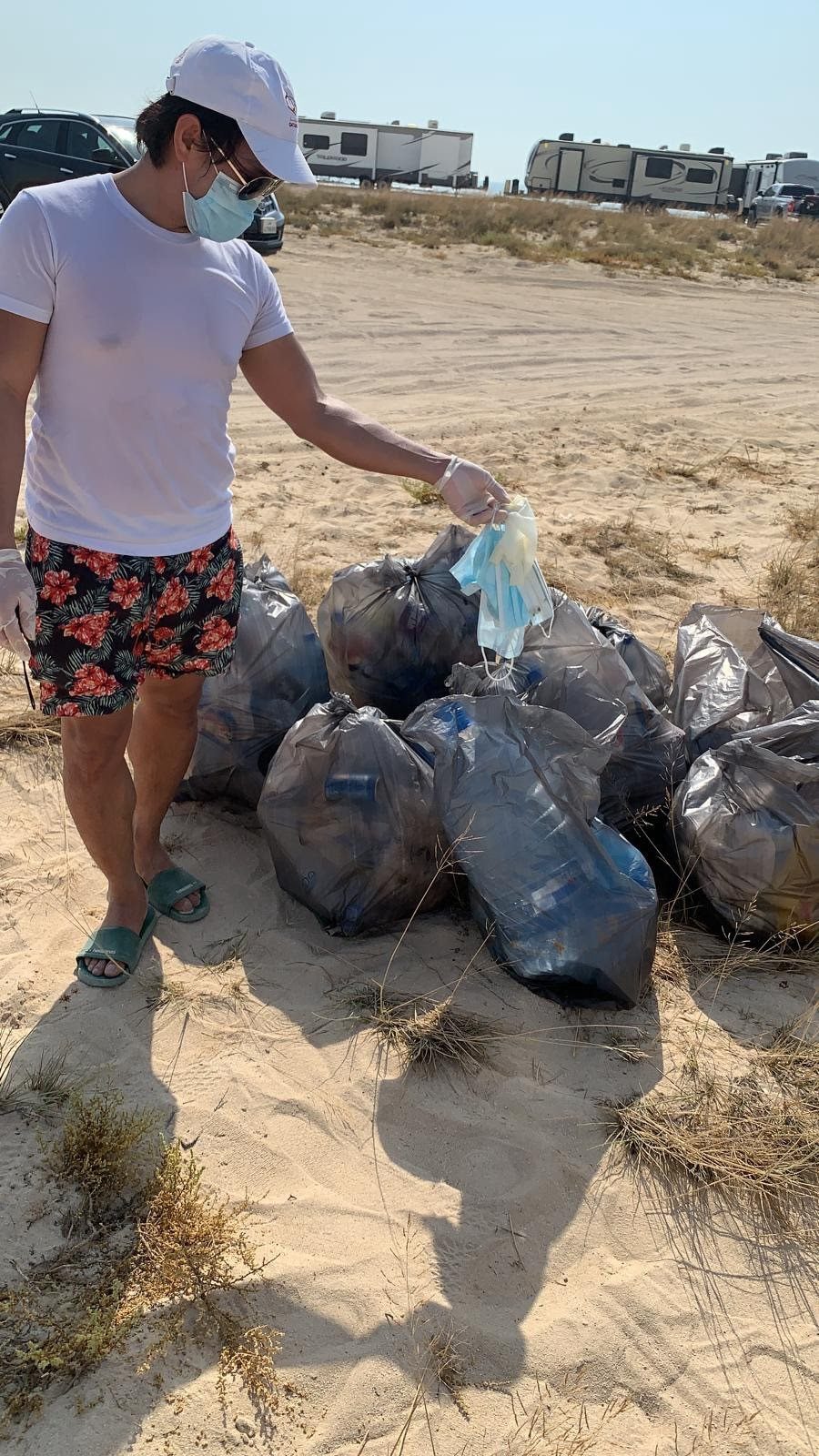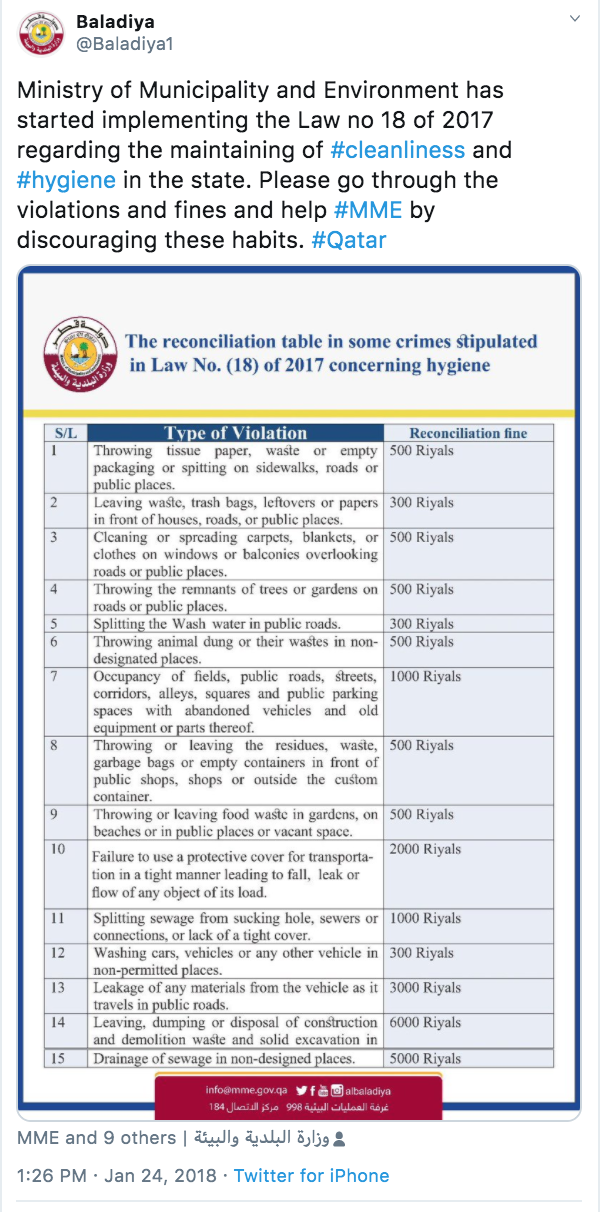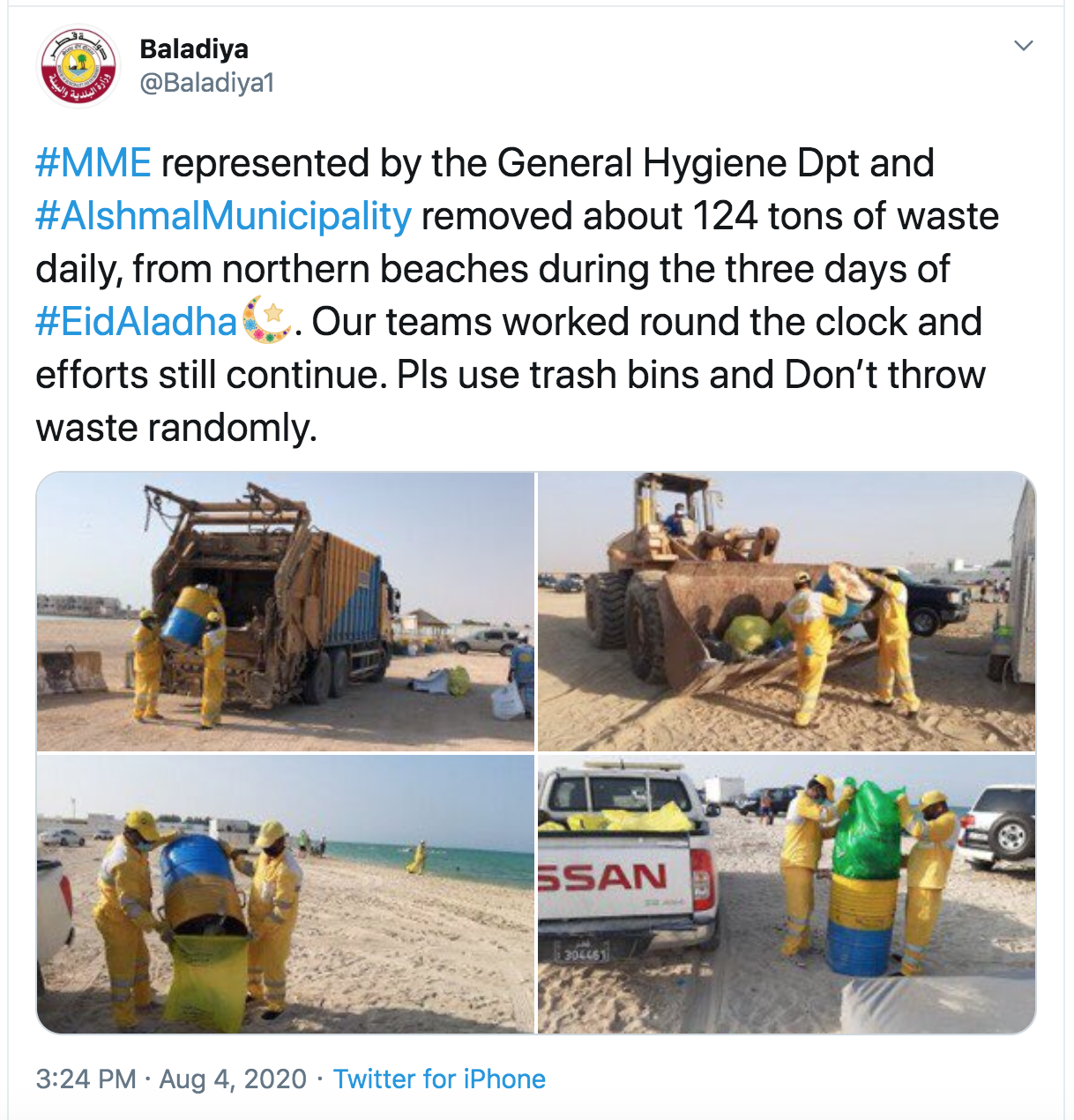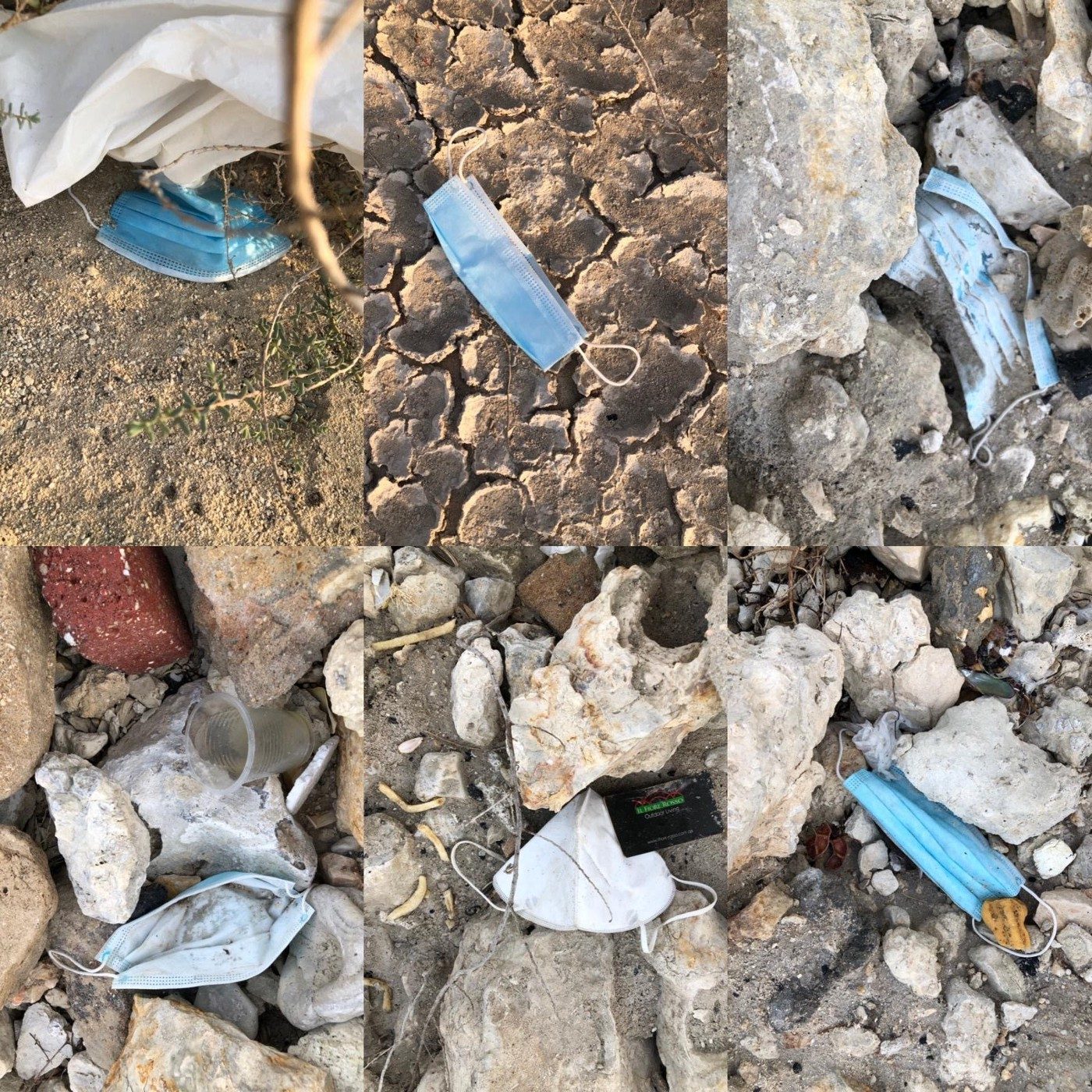by Salwa Sadek
Despite Qatar’s commitment to its National Vision 2030 plan and to the Sustainable Development Agenda 2030, single-use disposables and plastic waste have been on the rise since the pandemic, adding to Doha’s already existing plastic pollution problem.
Given the recent COVID-19 pandemic, the upsurge in positive confirmed cases since March, has led to the increase of plastic and single-use disposable waste, due to medical precautions and safety which instructs individuals to not use face masks or gloves more than once.
While single-use plastics, including surgical masks, plastic gloves, and bottles of sanitiser have been vital in supporting society during COVID-19, the accumulation of plastic waste on the roads and beaches around Qatar continues to pose threats to public health and the environment.
“The world that is reopening from coronavirus lockdown is wrapped in plastic — most of which will never be recycled, not just Qatar but a global phenomenon,” said Neeshad Shafi, a Climate Advocate, Energy and Policy Expert on the Middle East.
Given this immediate reality, many organisations such as Doha Environmental Actions Project (DEAP), a volunteering organisation leading the fight against plastic pollution and the beach cleanup movement in Qatar, have taken steps to try and fix the problem of plastic pollution in Qatar, through their beach cleanups every Friday.
So far DEAP has done eight beach cleanups since COVID-19 phase 2 kicked in, and in every single beach the team has visited, they have found many face masks and gloves left behind. Jose Saucedo, Director of DEAP, says that masks and gloves are joining a list of long time offenders: Plastic bottles, plastic bags, fishing nets and gear. “If we don’t take actions we will be finding masks and gloves in our beaches for years to come,” said Saucedo.

While these beach cleanups have helped clean and remove a lot of trash from Qatar’s landscapes, Shafi explains that, “the only way to really make a difference is to stop plastics from entering the ocean in the first place.”
“This can only be achieved when plastic producers are made accountable,” said Shafi.
Existing laws regarding public hygiene
As far back as 1974, Qatar passed a “general cleanliness” law, however in 2017 this law was replaced with Law №18 on Public Hygiene, which bans littering and dumping of waste in any sort of public space. Despite the prohibition of littering in public places and penalties in place for those who violate the law, the country remains a major polluter, with single-use plastics remaining ubiquitous and recycling systems undeveloped.

According to EcoMena, Qatar produces more than 2.5 million tons of municipal solid waste each year, and has one of the highest per capita waste generation rates worldwide of up to 1.8 kg per day, where only 8 percent of that waste is recycled.
Saucedo said that due to lockdown and people unable to travel overseas during the summer months, “we are finding just as much plastic waste as before, if not more.” He explains that as a result, all of Qatar’s beaches are being heavily littered with disposable face masks and gloves, including Fuwairit beach, where the endangered Hawksbill turtle nests.
According to Saucedo, on average every volunteer in their cleanups gathers 11kg of trash, depending on the number of volunteers they can collect between 100 kilos of trash to 5 tonnes.
The Ministry of Municipality has also continued its efforts to clean beaches and public places in various regions of Qatar during the Eid holidays. During the three days of Eid, an integrated team that works around the clock removed around 124 tonnes of waste per day.

Despite beach cleanups, this isn’t stopping the purchase and use of single-use plastics especially during a pandemic, and as a result, is deviating away from Qatar’s National Vision 2030 plan and its commitment to the Sustainable Development Agenda 2030, which aims — among other goals — to ensure environmental management and protection to ensure future sustainability of the country.
While it is essential to protect and support the vulnerable such as health workers and doctors during this crisis and prevent health-care systems from collapsing and additional waves of infection. Shafi explains that “in meeting these imperatives, we cannot lose sight of the other perhaps greater long-term challenges facing humanity, including the environmental and public-health risks generated by excessive plastic waste”.
Even though there are alternatives to wear reusable washable masks, these have not been medically approved, leading to the single-use disposable face mask that is widely used around Qatar and the world, to gain popularity in purchase and use.

Plastic packaging on the rise
With the rise of takeaway deliveries due to lockdown, plastic waste from packaging has surged dramatically over the last months. Since COVID-19 many customers have noticed the extra plastic packaging and plastic bags when they would order home deliveries.
“I don’t know if this is from the restaurant itself or Talabat but their way of packaging changed by adding plastic wrapping and extra plastic bags, to be in line with COVID19 regulations” said Abdullah Malek.
The surge of plastic under the current pandemic is an example of the lack of reusable options when it comes to being plastic free. While alternatives to plastic exist, under a medical crisis single-use plastics play an important role in preventing the spread of disease and viruses, and consequently actions towards helping protect our environment have been undermined.
“When I started food shopping when COVID-19 started, I sought a safe solution from transferring the virus and therefore stopped using my reusable shopping bags and started reusing plastic bags that I could throw away,” said Jennifer, a mother of four. Jennifer explains how she observed consumer behavior changed with the fear of the contagious nature of the virus encouraging us to look for throw away solutions.
While Qatar aims to brand itself as “environmentally friendly” and “sustainable”, Shafi explains how although new start-up companies have recently invested in more environmentally friendly packaging, gaining a better reputation, the current “COVID-19 crisis threatens to stall and even reverse progress.”
Reawakening the ecological consciousness of the Qatar community
Students from Qatar Foundation have held campaigns in the past calling for Qatar to ban plastics bags and to raise awareness on the impact of single-use plastic bags on the environment and marine life. The Arab Youth Climate Movement in Qatar have also taken a step in pioneering and inspiring the community to take effective action in resolving the current ecological crisis by engaging youth in co-creating solutions to our local environmental problem.
Shafi explains that shifting attitudes and changing policies or practices does not happen overnight given that cultural barriers, political hindrances, as well as lack of interest from the critical stakeholders can be massive setbacks.
“Fostering action and change in the community requires a lot of persistence, commitment and work at the grassroots and at the policy level” said Shafi.
While there is a long way to go in regards to changing regulations of plastic use in many places including supermarkets, Qatar’s Ministry of Municipality and Environment has implemented bins encouraging organisation of waste. Adopting such a strategy and encouraging the use of these bins by individuals and manufacturing companies has helped ease the recycling process and attempt to curb plastic waste across Doha.

“We are hoping to see more recycling facilities, the ministry have launched a recycling bin initiative this year and now with business going back and schools restarting in September, this will be revived,” said Shireen Obeidat from Qatar Green Building Council (QGBC).
Obeidat explains that with past campaigns from the Ministry of Municipality and Environment (MME) like the Carrefour for no plastic bags “No Plastic Tuesdays”, where single-use plastic bags were replaced with eco-bags, has helped raise awareness leading to more people now opting for reusable masks amid the pandemic.
Although Qatar claims to be one of the leaders of sustainability in the Middle East, it is evident that much more work needs to be done.
“In general all industries have a huge opportunity to not only reduce waste, but also costs by eliminating the use of single-use plastics on their day to day operations,” said Saucedo.
Qatar’s ambitious 2030 vision is a broader vision for development. However, Shafi emphasises the fact that plastic pollution isn’t the only threat the environment faces, and that issues such as climate change and the fossil fuel industry play a massive role in plastic pollution pre and post COVID-19.
Obeidat explains that although we have witnessed an unavoidable increase in waste production for safety reasons, “this just has highlighted the importance of considering a greener recovery in a way to catch up with Qatar National Vision (QNV) and Football World Cup carbon neutral commitment, to make up for the delay that was caused by the crisis” said Obeidat.
While plastic pollution is one of the biggest challenges that the world is trying to figure out, said Saucedo, “I’m convinced that with some leadership behind it, we can fix this problem in Qatar and become a benchmark for the region and the rest of the world.”







